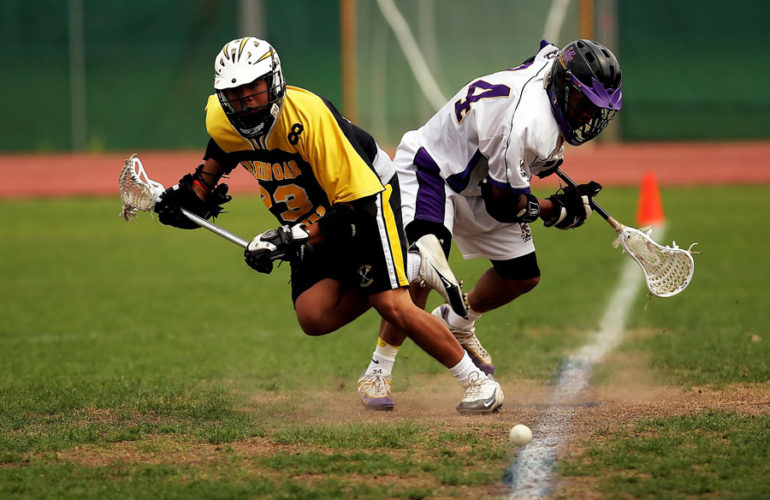Ever since you were a kid baseball has been your life and you practice tirelessly with the hope to one day achieve your dream of getting recruited by a D1 college and then moving on to play in the Pros. Whatever sport you play, you live it, breath it and can’t imagine life without it. You believe you are good enough to play at the next level, but what you don’t know is how exhausting, confusing and frustrating the recruiting process is. Though there is a lot of work involved, if playing sports in college is your goal, it is very possible for you to achieve it.
I have played soccer at a fairly high level for a good amount of my life, including playing in Italy for a talent identification program as well as D1 soccer at Sacred University. Coming from a very competitive family where my brother also plays D1 soccer in Virginia, I am no stranger to the overwhelming process of being recruited to play sports in college. Whatever sport you play and whatever level you are at, you should be assured that there is a way for you to continue playing the sport you love while you are in college. Whether you play Varsity, Intramural or Club, you will have that total experience with the right level of competition and pressure that suits you. Moving on to play in the pros, well, that’s another story but for now, here is some advice for those looking to play at the next level.
Before you start on your way to the recruiting process, you should have a conversation with coaches, teachers, counselors and parents to discuss the “right fit school.” A focus on academics is top priority but also taking athletics into consideration along with the ideal location for campus, class size, social environment, cost and available merit money, among other things. The school that you choose will be home for the next four years so it is important to have the conversation and narrow down the options because talking to coaches is even easier when you know what you want and where you will be most comfortable. Notice that I didn’t suggest “Division” in the initial assessment of “the right fit school”. For the most part, a very small percentage of athletes will move on to play at the D1 level and even fewer will be recruited, or “receive an athletic scholarship.” D1 athletes are usually the top percent in the country, playing at a very high level or with an elite team and are known throughout their sport from a fairly young age. This is not to say that others won’t have an opportunity to try out, but being recruited to “play D1” is not the norm and definitely not the only option.
From my experience with this process, three of the most important things about recruitment are your high school grades and test scores, being organized and being assertive. Most young athletes think that colleges don’t care about athletes’ grades – which is simply not true. In order to play at the D1 or D2 division, grades are critical to being allowed to play. Being organized means knowing the recruiting calendar of when coaches can speak with you and which schools are of interest. All athletes who aspire to play in college should register with the NCAA Eligibility Center and learn when the coaches can contact you to learn more about you and when they can make offers. Most importantly, the NCAA posts the sliding scale of grades/test scores and how to tally quality points. Being assertive means helping the coach find you – often times college coaches do not know who you are despite how good you may be. A college coaches’ job is extremely complex, dealing with finances, players that may be coming from overseas, managing other coaches, travel, recruiting, as well as focusing on the current season. Coaches do not have time to search the internet to look for you. Instead they rely upon the recruiting sites, they may ask around to their colleagues, high school and club coaches about any talent in the area that may fit on their team. They also respond to well-written emails and outstanding highlight videos, so, do not be afraid to be persistent with your emails and let them know who you are and why you are a good fit for the school and how you will be an impact on the team. Send a brief introduction about yourself including the sport/position you play and what you like about the school and mention what you would like them to get from your highlight video. Also, if you know about the coach or know of someone who plays for him/her, do not be afraid to say so and ask that person to make a warm introduction. Keep them up to date on when you will be playing your season and any major tournaments, tell them where you’ll be, the team you play for and your number. Find out when the sport you play traditionally starts to recruit/fill the roster and make sure you have contacted the coach at the schools of interest — if they don’t know who you are, they can’t scout you!
After all the emails and videos you send, what happens when the coach doesn’t respond? What do you do next? As I mentioned, coaches are really busy and athletes have to realize they are being bombarded by every high school junior and senior who thinks they want to play on that team. Do not get discouraged. If you do not hear back from a coach, do not take it as a “no” unless it is specifically stated they are not looking to recruit you. Stay hopeful on your journey, and know that it is a journey. You are definitely allowed and encouraged to visit schools you are interested in and if you plan on being on campus, let that coach know when you will be there and they may just meet you and talk about what they are looking for in the upcoming recruitment year. Also, now that coach now knows who you are and may look to scout you at the next tournament or game you have.
So I mentioned it earlier, but truly, my most important tip for the HS athlete who is looking to play sports in college would be to choose a school for the academics not just for sport. Although it is entirely possible for you to be the next person to be drafted in the NBA, however, it is not very likely which makes academics even more important because college is the best opportunity to explore what you are interested in and study to pursue it as a career path. The recruiting process is frustrating and often times confusing but be persistent because representing your college or university on the field is a very rewarding experience no matter what level you play.



